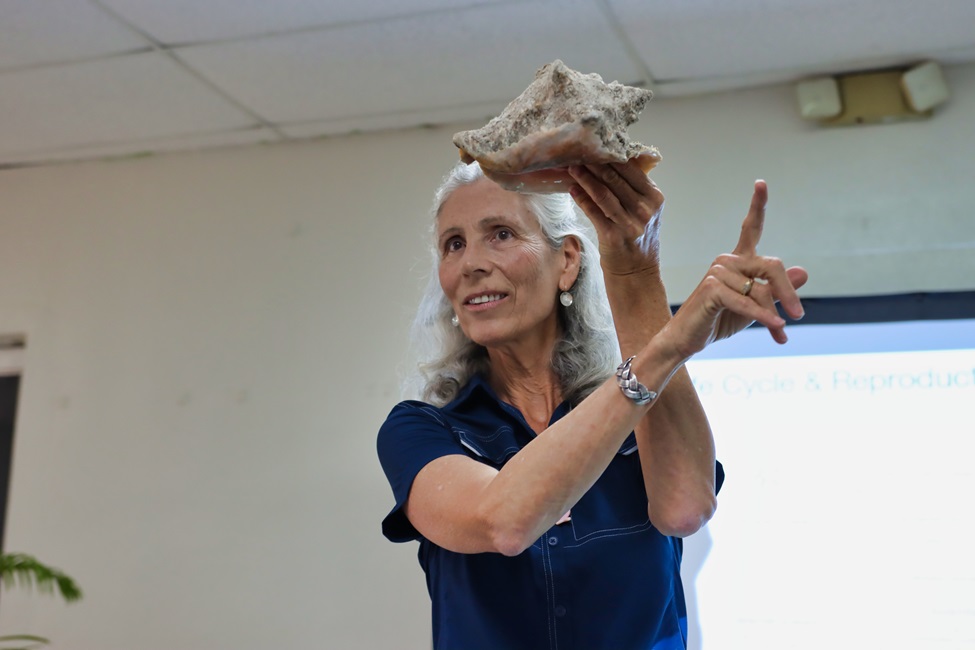FAU Harbor Branch Launches 'eConch' to Grow, Conserve the Queen Conch

Megan Davis, Ph.D., a research professor at FAU’s Harbor Branch Oceanographic Institute, teaching in the Bahamas. (Photo credit: IsleLens - Tyrie Moss)
The queen conch (Aliger gigas) is a prized delicacy long harvested for food and revered for its beautiful shell. With a lifespan between 25 to 40 years, the queen conch is second only to the spiny lobster fishery and is the most important molluscan fishery in the Caribbean region.
Deeply rooted in the way of life in the Caribbean, many island communities depend on queen conch for their livelihoods. However, intensive fishing and habitat degradation from urbanization and climate change have caused conch populations to significantly dwindle.
Megan Davis, Ph.D., a research professor at Florida Atlantic University’s Harbor Branch Oceanographic Institute, has spent more than 40 years conserving and restoring the queen conch. Now, she and Becky Holt, an assistant director for their aquaculture and conservation program at FAU Harbor Branch, share their vast expertise and knowledge in growing and sustaining the queen conch.
Davis and Holt recently launched “eConch,” a free online training program to grow queen conch, which was developed in collaboration with FAU’s Center for Online and Continuing Education. The program is easy to follow, allows users to move at their own pace, includes high-quality video and provides access to expert advice. The training also includes a comprehensive manual, which provides step-by-step complete illustrations and photos of how to culture queen conch.
The manual includes the science and art of growing queen conch, which Davis developed over four decades, designing, implementing and operating experimental size aquaculture facilities as well as production-scale facilities in Florida and throughout the Caribbean.
“We have received numerous requests throughout Florida and the Caribbean from community members, researchers, aquaculturists, conservationists, educators and students to learn how to conserve and culture queen conch,” said Davis, who is internationally renowned for her research and work with queen conch. “We are incredibly excited to be able to respond to these inquiries with eConch, a first-of-its-kind, free online training program.”
eConch is an experiential online learning program that includes seven descriptive how-to modules. Module topics include collection and hatching of egg masses; larval rearing in the hatchery; microalgae culture to feed the larvae; metamorphosis; nursery culture of the juveniles; ranching for food; and restoration of the species.
“In addition to their socioeconomic importance, the queen conch plays a critical ecological role in seagrass beds,” said Davis. “Aquaculture, along with conservation of breeding populations and fishery management, are ways we can help ensure longevity of this important species.”
In 2019, Davis teamed up with Conservación ConCiencia and Naguabo Fishing Association in Puerto Rico to assist with stock enhancement of the queen conch. The Naguabo Aquaculture Center, which has a queen conch hatchery and nursery for restoration, serves as a demonstration and training facility for Puerto Rico and other Caribbean countries.
“Our work in Puerto Rico has been instrumental in developing and launching eConch and providing an innovative way to save the queen conch,” said Davis. “eConch uses videos and visuals from the Naguabo Aquaculture Center to provide an immersive and hands-on learning experience.”
The goal of this collaboration in Puerto Rico is to produce up to 2,000 queen conch juveniles in a fishers-operated aquaculture facility for release into conch juvenile habitats. The Saltonstall-Kennedy NOAA Fisheries and USDA Agricultural Research Service funded project includes aiding sustainable fisheries practices through aquaculture. The team is working with the fishery communities, utilizing the commercial Fishing Association’s working waterfront for conch aquaculture infrastructure, helping provide diversified incomes for the fishery and local communities, promoting aquaculture practices and ensuring the conch population is available for future fishing and food security through aquaculture and restoration.
For more information about eConch, visit www.conchaquaculture.org.
-FAU-
Latest Research
- FAU REPORT: Consumers Face Elevated Prices Despite Waning InflationThe years of high inflation appear to be over as inflation is now in line with the Federal Reserve's target, though prices will likely remain permanently elevated, according to the Monthly Inflation Report.
- FAU Engineers Win NSF Grant for Unique School of AI Bio-Robotic FishA school of bio-robotic fish with advanced sensors will create a versatile network capable of maneuvers and station-keeping beyond current vehicles in shallow coastal areas and in deep ocean environments.
- FAU Poll: Presidential Race Tightens Across Key Battleground StatesLatest FAU polls reveal a highly competitive landscape in the battleground states of Michigan, Pennsylvania and Wisconsin, with both the presidential and U.S. Senate races showing narrow Democratic leads.
- Poll: Races Neck-and-Neck in Final Weeks, Florida Amendments May PassThe latest polls reveal tight national races and Florida amendments on the cusp of passing.
- FAU Awarded DOE Grant to Test Offshore Ocean Current EnergyFAU's Southeast National Marine Renewable Energy Center has received an $800,000 grant from the U.S. Department of Energy to advance ocean energy technologies with a test facility offshore Palm Beach County.
- Dramatic Drop in Marijuana Use Among U.S. Youth Over a DecadeUsing a national survey of 88,183 U.S. adolescents in grades nine to 12, a study shows marijuana use declined from 2011 to 2021. Findings also reveal changing landscapes of use by gender, race, and ethnicity.






